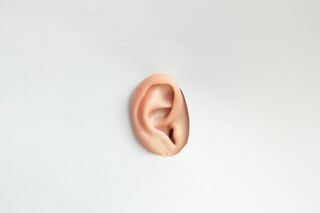Body Language
We're Worse at Listening Than We Realize
People aren't as good at listening as they think, but it is possible to improve.
Posted August 4, 2021 Reviewed by Chloe Williams
Key points
- According to a survey, 96 percent of people think they are good listeners, yet people only retain about half of what others say, research shows.
- People are often distracted, thinking about what they are going to say or making assumptions when listening, which can lead to misunderstandings.
- By removing distractions, staying curious, not making assumptions, allowing silence, and asking questions, people can become better listeners.

Most of us take listening for granted. People talk and the talking goes into our ear holes. End of story.
In one survey, 96 percent of respondents said they were always or sometimes good listeners.
However, one study showed that we retain only around half of what people say to us. And that’s directly after they say it, so don’t blame your long-term memory, people.
The good news is that women were significantly better listeners than men. Sorry, guys.
The bad news is that there’s a massive disconnect between the confidence in our listening and our actual abilities.
In short, we’re crummier listeners than we realize.
The other problem is that not many people realize the importance of listening. In Susan McPherson’s book The Lost Art of Connecting, she illustrates this disconnect by pointing to Julian Treasure’s popular Ted Talks. His presentation called “How to speak so that people want to listen” has over 47 million views. Unfortunately, his talk “5 ways to listen better” has less than 10 million.
We’re more interested in being heard than in hearing.
And that’s a problem.
Why We Should Focus on Listening
We spend about 45 percent of our communication time listening and 30 percent talking. (That's an average. I definitely know more talking-heavy communicators.) You'd think we'd spend more time trying to improve our listening, right?
We’re often spending our listening time thinking about what we’re going to say next or, worse still, thinking about something else entirely.
Deep listening is an immersive experience. You can’t be distracted. You can’t be thinking about yourself. All your focus has to be on the other person, their body language, subtle cues about what they’re really trying to say, and not just on their words.
Ximena Vengoechea takes a deep dive into listening in her beautifully illustrated and comprehensive book Listen Like You Mean It. She explains what deep listening entails and what happens when we give listening short shrift: misunderstanding.
When we make assumptions or aren’t fully engaged with our conversation partners, misunderstandings are much more likely to occur.
Think about it. When someone interrupts you, how does it make you feel? When someone assumes they know what you’re going to say or finishes your sentence, what’s that like?
How Can We Improve Our Listening?
1. Don’t Assume
Leave your assumptions at the door. Even if you think you know where a conversation is headed, play dumb and remain open to what your partner is saying.
2. Be Curious
Instead of grinning and bearing it, find something to be genuinely curious about. Listen to learn or to be surprised. Try to figure out what makes other people tick.
3. Ask Questions
If you want to go deep with someone, you’re going to have to ask follow-up questions and keep the conversation moving forward.
4. Stop Making Everything About You
Instead of bringing up personal anecdotes at every turn, try to keep the conversation about the topic at hand. If your friend is talking about their dog, you definitely don’t need to talk about your dog because the conversation is about your friend’s dog. Not your dog. Got it?
5. Allow Silence
Rapid-fire conversations can feel lively and engaging, but they don’t leave the space for everyone to share their thoughts. Pause and wait if you want someone to say more.
6. Monitor Body Language
Deep listening also involves paying attention to what’s not being said. Pay attention to people’s facial expressions, posture, and body language if you want to hear the full story.
7. Clarify
Make sure you’re on the same page by asking if you’re on the same page. Do I have that right?
8. Remove Distractions
At the very least, give people your undivided attention. Keep your phone in your pocket and do not try to multitask.
Improving Listening Doesn’t Have to Be a Chore
I recently spoke with Greg McKeown on his popular podcast What’s Essential? about how to make deep listening more effective and fun.
Here are three games from my book Play Your Way Sane that I mentioned during the podcast that will help you boost your listening.
1. Yes, And
If you want to make sure you’re listening, try repeating the gist of what someone has said to you and then adding onto that topic. Is it clunky? It can be. But it’s the kind of drill that’s going to force you to beef up that listening.
2. Teach Me, Sensei
To get out of your head and force yourself to be more curious when in conversation, pretend everyone else is a wise old teacher, and you’re just trying to collect some wisdom nuggets. When you listen to learn, you’re much more likely to stay focused and engaged.
3. Hard-Hitting Reporter
Journalists are known for asking open-ended questions and getting their interviewees to spill all the beans, so why not pretend you’re a reporter? The next time you’re losing focus, grab an imaginary microphone and get to the bottom of whatever it is your conversation partner is saying.
Can Better Listening Change the World?
If our listening skills were as good as we thought they were, we would have fewer arguments. More people would feel safe to share their thoughts and ideas. In turn, we’d all feel more understood.
So instead of focusing on how we can talk to make people want to listen, let’s address the disconnect head-on. Take simple steps to improve your own listening. Be the example at work and at home for the kind of listening that makes people feel appreciated and valued.
And the next time someone asks if you’re a good listener, think very carefully before you answer. Because listening is more than just words in your ear holes.
References
Drinko, C. (2021). Play Your Way Sane: 120 Improv-Inspired Exercises to Help You Calm Down, Stop Spiraling, and Embrace Uncertainty. Tiller Press.
Lee, D., & Hatesohl, D. Listening: Our most used communications skill. University of Missouri Extension. https://extension.missouri.edu/publications/cm150.
McPherson, S. (2021). The Lost Art of Connecting: The Gather, Ask, Do Method for Building Meaningful Business Relationships. McGraw-Hill Education.
Sullivan, B., & Thompson, H. (2013, May 3). Now hear this! most people stink at listening [excerpt]. Scientific American. https://www.scientificamerican.com/article/plateau-effect-digital-gadge….
Vengoechea, X. (2021). Listen Like You Mean it: Reclaiming the Lost Art of True Connection. Penguin.




